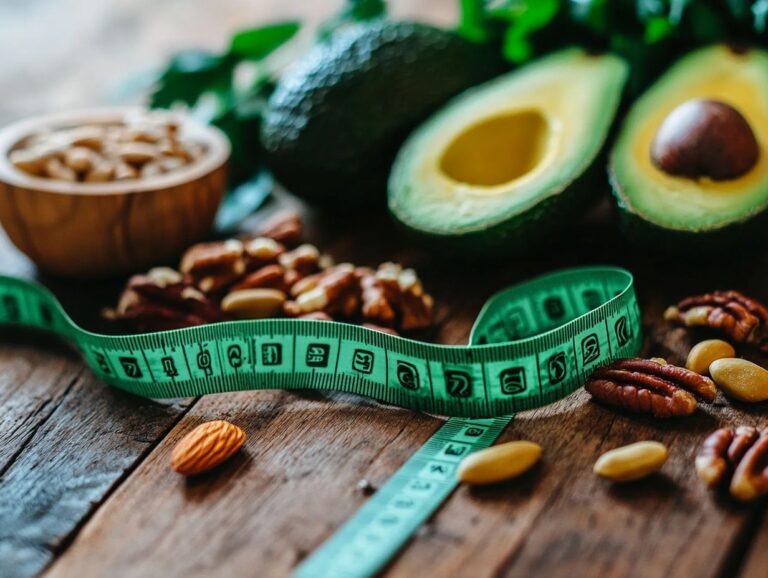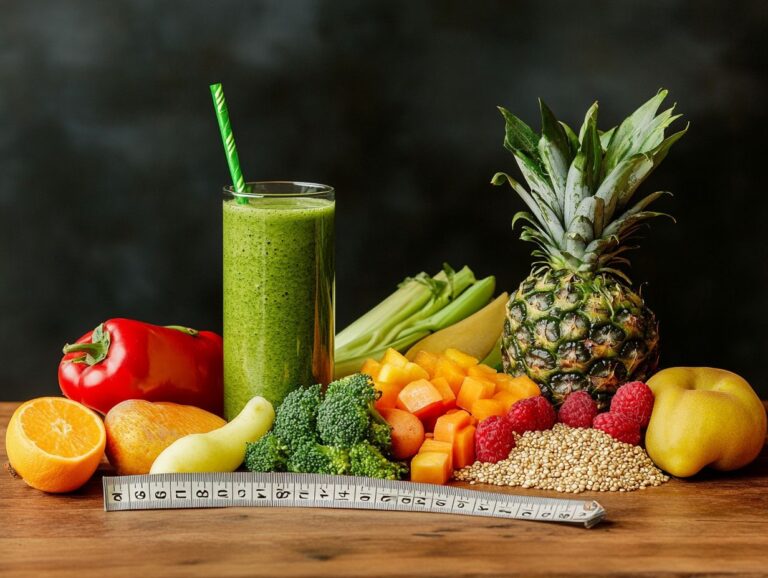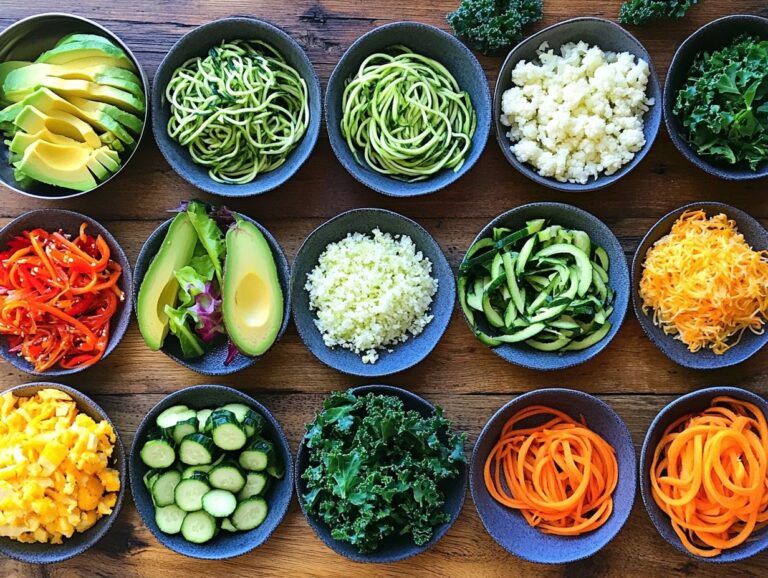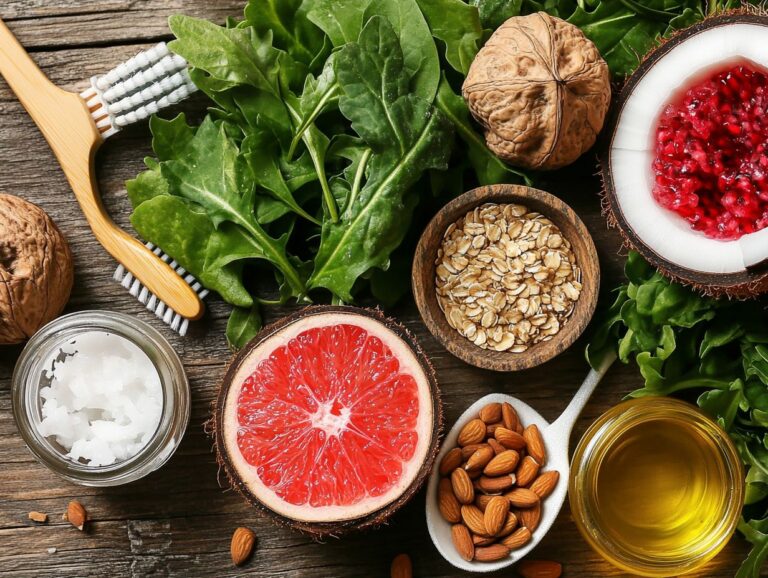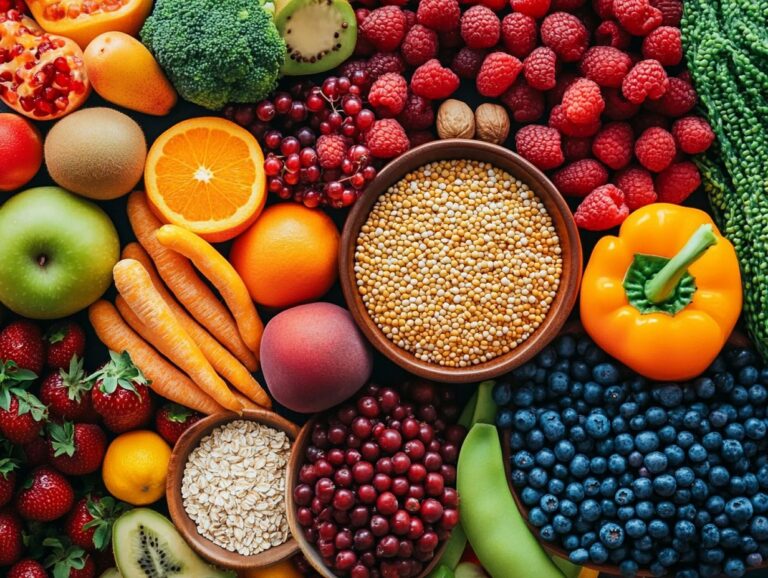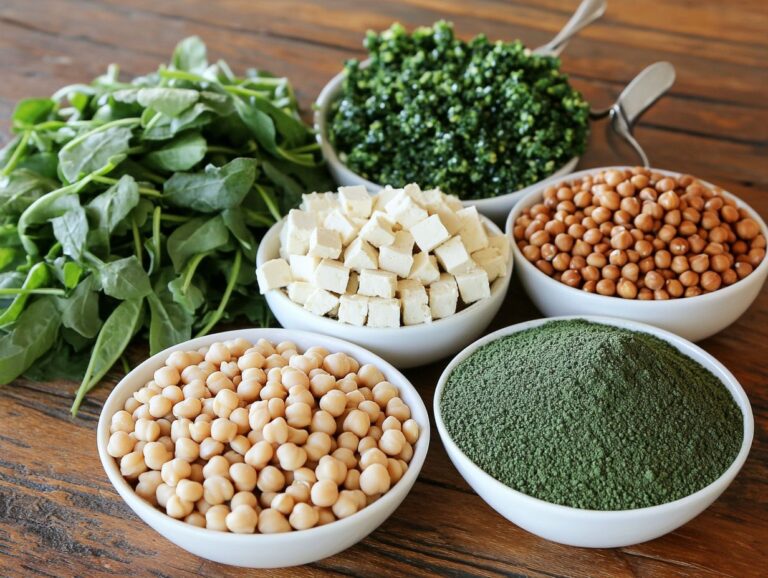This article will outline what to expect, including effective strategies for weight loss and the essential components of a vegan diet, along with the science that supports the success of these elements. Additionally, it will cover the benefits of adopting a vegan lifestyle, the challenges you may encounter, and how to prepare for a transformative month.
Key Takeaways:
- A 30-day vegan diet can lead to weight loss and improved overall health.
- The key components of a vegan diet are plant-based foods and the science behind weight loss involves increased fiber and decreased calorie intake.
- Benefits include weight loss, decreased risk of chronic diseases, increased energy, and improved digestion.
What to Expect from a 30-Day Vegan Diet for Weight Loss: Results and Tips
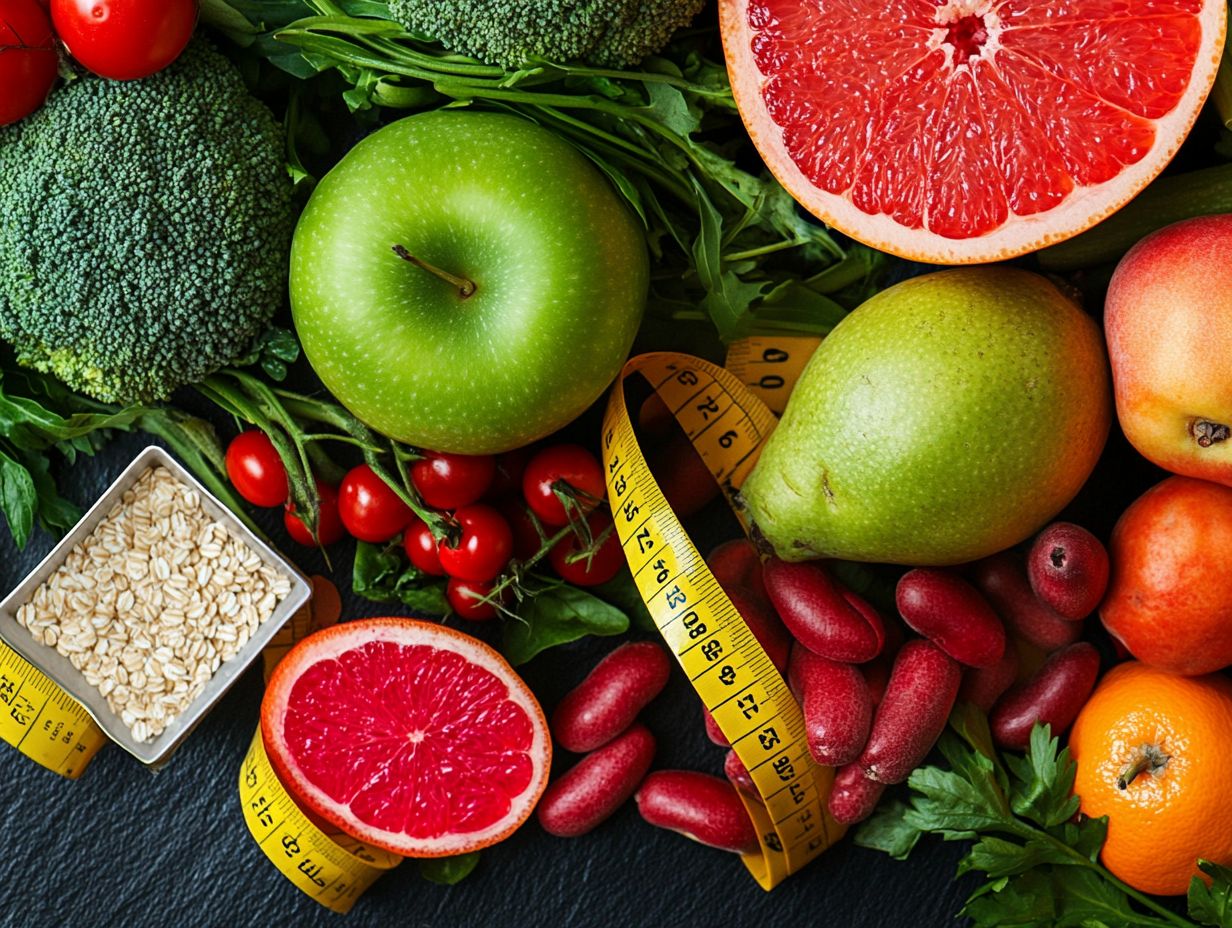
A 30-day vegan diet is designed to promote weight loss and enhance overall health by incorporating a diverse range of plant-based foods.
This diet includes whole grains, legumes, fruits, vegetables, and nuts, which provide essential protein, fiber, and vitamins, necessary for optimal nutrition and health.
These whole foods, rich in plant nutrients, help to reduce inflammation and chronic pain, such as that caused by a herniated disc.
By employing creative meal preparation and cooking techniques, including meal prep for snacks and meals, individuals can discover a variety of delicious recipes that keep them energized and satisfied throughout the day.
How Does a 30-Day Vegan Diet for Weight Loss Work?
The key components of a 30-day vegan diet for weight loss include focusing on whole foods, nutrient density, and mindful eating, as advised by dietitians like Rachael Schultz and Jill Nussinow from publications such as Shape and EatingWell.
Incorporating whole food, plant-based protein sources such as legumes, tofu, and nuts helps reduce caloric intake while increasing fiber consumption, which promotes better digestion and enhances feelings of fullness.
This approach can also lead to lower cholesterol levels and improved energy, making weight management more manageable.
What Are the Main Components of a Vegan Diet?
A vegan diet primarily consists of legumes, whole grains, fruits, and vegetables, which together provide essential nutrients while eliminating animal products. This dietary approach emphasizes the incorporation of plant-based proteins, healthy fats, and high fiber content, enabling individuals to create balanced meals that nourish the body and support a healthy weight.
Various cooking techniques can be employed to develop delicious recipes tailored to personal preferences. Key components like leafy greens are rich in vitamins A, C, and K, which are vital for skin and immune health. Nuts and seeds offer important omega-3 fatty acids that benefit heart health. Whole grains are abundant in B vitamins and minerals, essential for energy metabolism and digestive processes. Legumes, such as beans and lentils, are excellent sources of protein and fiber, contributing to the maintenance of healthy cholesterol levels.
Exploring cooking methods such as steaming, roasting, or stir-frying can enhance the flavor and texture of these ingredients, making it easier to prepare vibrant and nutritious meals that meet individual dietary needs.
What Is the Science Behind Weight Loss on a Vegan Diet?
The science behind weight loss on a vegan diet highlights how specific nutritional features, such as high dietary fiber content and low saturated fat content, contribute to effective weight loss.
Research indicates that plant-based diets help reduce inflammation and improve metabolic health, both of which support long-term weight loss. This effectiveness is largely due to the reduced caloric density of vegan foods, which allows for larger portion sizes while still maintaining the caloric deficit necessary for weight loss.
Studies show that individuals following a vegan diet consume, on average, 300 fewer calories than their meat-eating counterparts, likely due to the generous inclusion of fruits, vegetables, whole grains, and legumes. These foods are rich in protein and dietary fiber, both of which play a crucial role in increasing feelings of fullness and decreasing hunger.
A study published in the Journal of Nutrition found that individuals on a vegan diet reported higher satiety scores compared to those on omnivorous diets.
Experts recommend that people on a vegan diet prioritize sufficient protein sources, such as lentils and chickpeas, alongside high-fiber foods to enhance meal satisfaction and help maintain adherence to the caloric targets necessary for weight loss.
What Are the Benefits of a 30-Day Vegan Diet for Weight Loss?
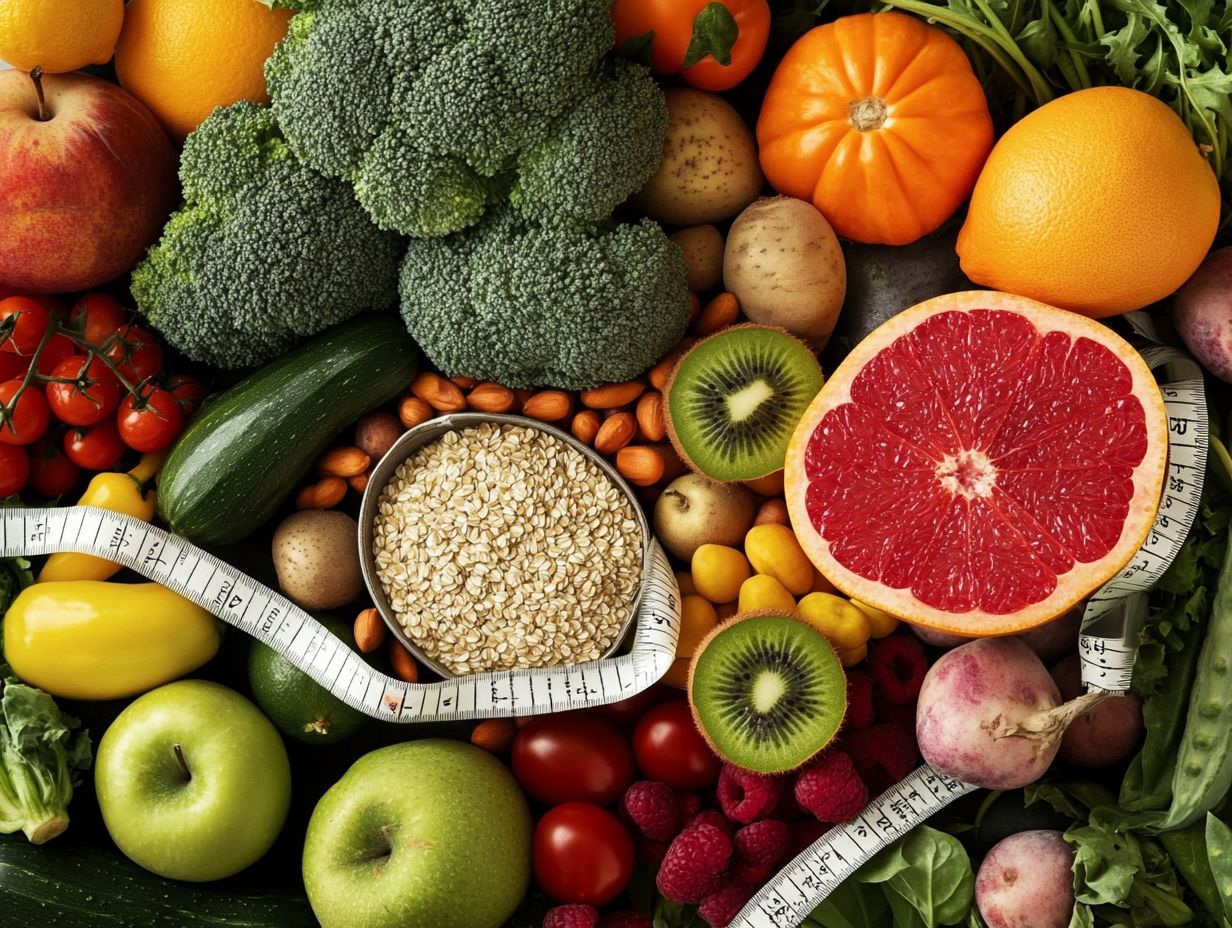
The benefits of a 30-day vegan diet include aiding individuals in weight loss while enhancing their overall health, with potential for improved cholesterol levels and energy from nutrient-dense meals.
This lifestyle change can lead to rapid weight loss, a reduced risk of chronic diseases, increased energy levels, and improved digestion.
By focusing on nutrient-dense, plant-based foods, individuals can anticipate better well-being and vitality as they transition to a healthier eating pattern.
1. Weight Loss
The advantages of a vegan diet include weight loss, primarily due to low calorie intake combined with high nutrient density.
Whole plant foods allow for larger portion sizes that are rich in vitamins and minerals, creating the calorie deficit necessary for weight loss. This type of diet typically includes high amounts of fruits, vegetables, legumes, and whole grains, which are lower in calories and high in fiber.
This fiber content helps individuals feel full longer, thereby reducing hunger. Research indicates that people tend to lose an average of 5-10 pounds over several months when they adopt a vegan lifestyle.
Many individuals share their experiences of shedding excess weight simply by eliminating animal products, reporting increased energy levels and improved eating habits.
Nutritionists note that the focus on plant-based foods often leads to a subconscious reduction in unhealthy fats and highly processed foods, further contributing to successful weight loss.
2. Lower Risk of Chronic Diseases
A 30-day vegan diet can significantly lower the risk of chronic diseases such as heart disease, diabetes, and certain cancers. This reduction in risk is attributed to the plant-based nature of the diet, which is rich in antioxidants and anti-inflammatory properties that help lower cholesterol levels and improve cardiovascular health.
Recent research conducted over the last decade indicates that individuals who adopt a vegan lifestyle are less likely to experience chronic inflammation, a key factor in the development of many diseases.
A study published in JAMA Internal Medicine reports that the risk of heart disease can be reduced by as much as 30% among those following a vegan diet, largely due to their high intake of fruits, vegetables, and whole grains.
Additionally, the absence of processed meats and saturated fats, which are common in non-vegan diets, contributes to better blood sugar management and can decrease the risk of developing type 2 diabetes by up to 50%. These findings highlight the significant long-term health benefits associated with such a dietary shift.
3. Increased Energy Levels
Many people report experiencing increased energy after adopting a vegan diet, which is largely attributed to the nutrient-dense nature of this eating pattern. A vegan diet is rich in fiber and complex carbohydrates, providing sustained energy and helping to regulate blood sugar levels throughout the day.
A diverse array of whole foods, including fruits, vegetables, legumes, and whole grains, contributes to a nutrient profile that is abundant in vitamins, minerals, and antioxidants. For instance, iron-rich foods such as spinach and lentils, when paired with vitamin C-rich fruits, can enhance iron absorption and reduce fatigue.
Meal timing is also important; consuming meals and regular snacks at appropriate times can help prevent energy dips and improve overall vigor. By balancing macronutrients and emphasizing plant-based sources, individuals may avoid the crashes associated with processed foods, leading to more consistent energy levels throughout the day.
4. Improved Digestion
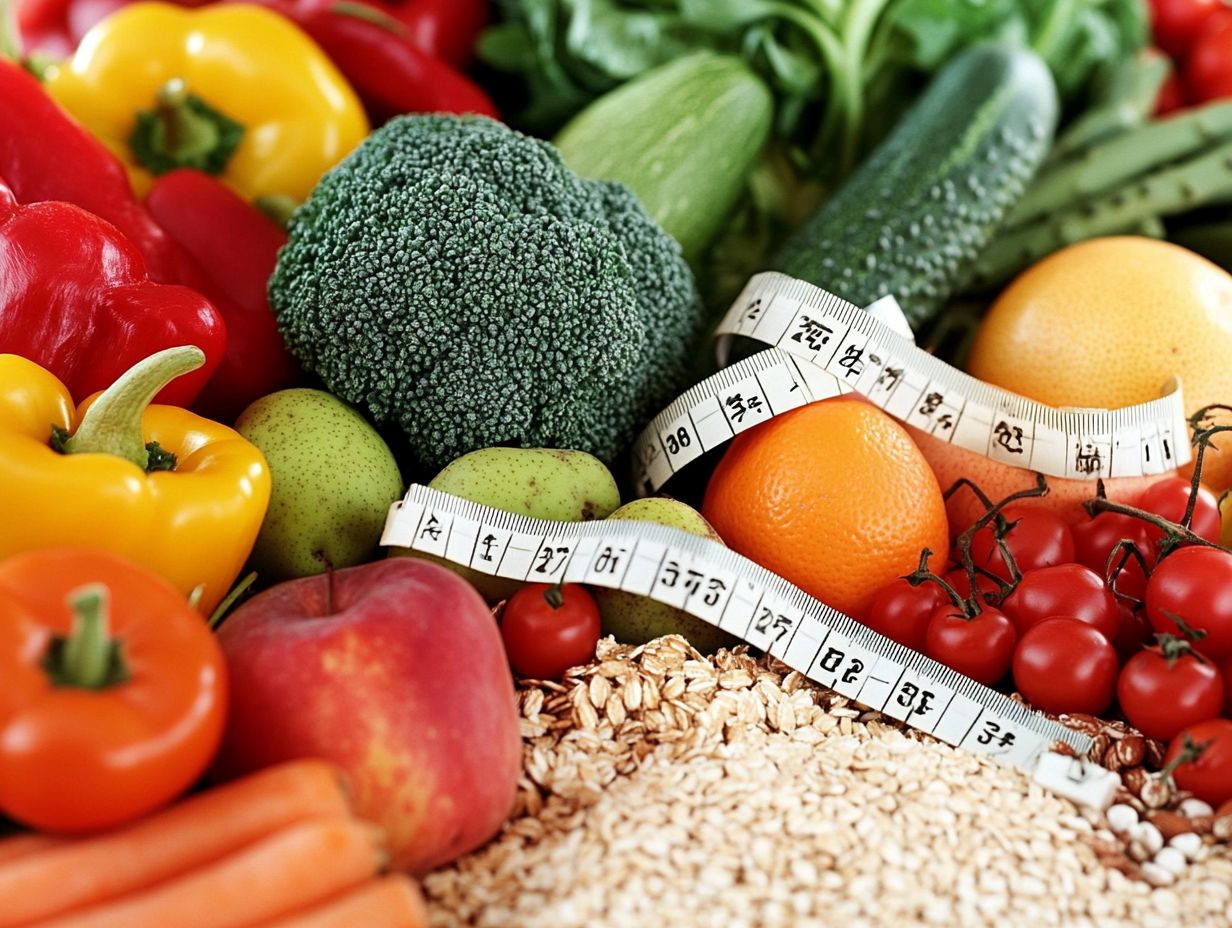
A vegan diet, which is high in fiber, has been shown to significantly improve digestion and gut health. This improvement is largely due to the increased consumption of fruits, vegetables, and whole grains, which promote regular bowel movements while reducing bloating and cramping.
Plus fiber, these plant-based foods are rich in essential nutrients such as phytochemicals, prebiotics, and antioxidants that support gut wellness. Phytochemicals found in colorful fruits and vegetables can enhance the diversity of gut microbiota, which is crucial for maintaining a healthy gut.
Naturally occurring prebiotics in foods like garlic, onions, and bananas nourish beneficial gut bacteria, contributing to a healthy gut environment. The combination of these nutrients can help prevent constipation and may lower the risk of gastrointestinal diseases.
What Are the Potential Challenges of a 30-Day Vegan Diet for Weight Loss?
The drawbacks of a 30-day vegan diet include the risk of nutrient deficiencies, social pressure related to eating habits, and intense food cravings. These challenges are common obstacles that individuals must navigate to maintain not only their weight loss goals but also their overall health.
Additionally, some people may encounter limited food choices on a 30-day vegan diet, which can complicate meal preparation and planning, but options like dairy-free and vegetarian recipes can help maintain variety.
1. Nutrient Deficiencies
The primary health risk associated with a vegan diet is the potential for nutrient deficiencies, particularly in vitamins B12, iron, and calcium, which are typically abundant in animal products.
Without proper meal planning and a good understanding of vegan nutrition, individuals may struggle to meet their dietary requirements. These deficiencies can lead to various health issues, such as anemia, increased susceptibility to infections, bloating, inflammation, cramping, and weakened bone health. Ensuring adequate fiber intake is also important to prevent issues like a herniated disc and chronic pain.
To mitigate the risk of these deficiencies, individuals following a vegan lifestyle should consider incorporating supplements and fortified foods into their diet. For instance, fortified plant-based milk and cereals can provide essential calcium and vitamin D, while algae-based supplements offer an alternative source of omega-3 fatty acids, which are crucial for reducing cholesterol and maintaining heart health.
By gaining a clear understanding of the nutritional landscape, such as knowing the best sources of plant protein and plant nutrients, and making informed food choices, the risks associated with a vegan diet can be effectively managed.
2. Social Pressure
Social pressure is a significant challenge of veganism that is often overlooked. This pressure is particularly evident during social gatherings or when dining out with friends and family who do not share the same dietary preferences. This can lead to difficulties in maintaining a dairy-free and vegetarian diet.
Many non-vegans may not fully understand what veganism entails, which can create situations that make it difficult for vegans to adhere to their diet and may lead to feelings of isolation. In these instances, individuals following a vegan diet may find themselves in uncomfortable positions, as the reluctance of others to accommodate their plant-based lifestyle can result in social awkwardness. They may face questions and comments about their choices that add to the discomfort, especially when discussing the benefits of a plant-based diet over a traditional diet.
Fortunately, this challenge can be alleviated by discussing dietary restrictions with hosts ahead of time and suggesting vegan menu options. Bringing a dish to share can showcase the variety and deliciousness of plant-based meals, sparking curiosity and understanding among others. These shared meals can also highlight the potential for healthy, nutritious, and satisfying eating experiences within the realm of veganism.
Plus these strategies, having open conversations about the ethical, environmental, and health benefits of veganism can provide valuable insight into the choices being made.
3. Food Cravings
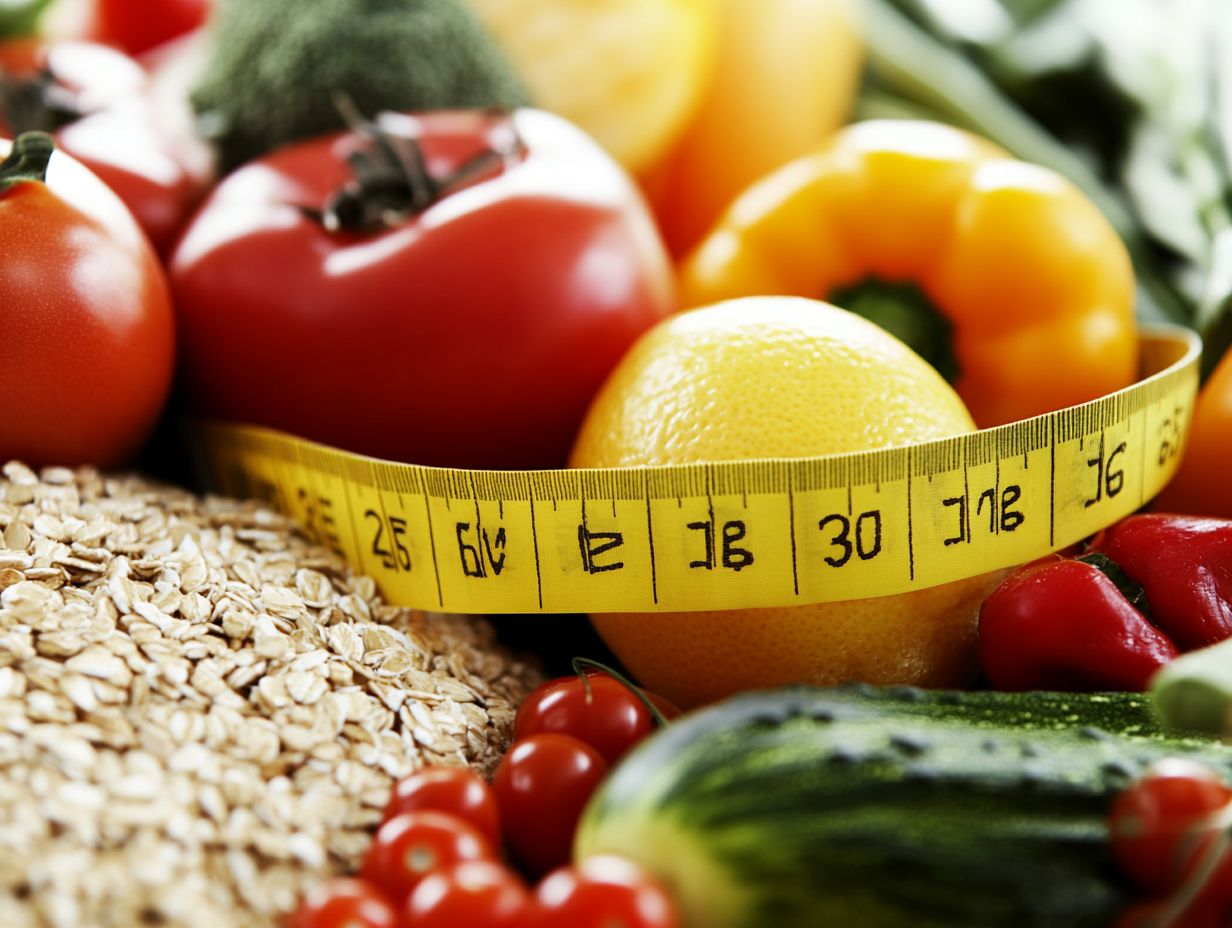
Food cravings present a significant challenge for those transitioning to a vegan diet, particularly for individuals accustomed to the taste and texture of animal products. Managing these cravings is crucial for effective weight management.
To manage these cravings while maintaining a focus on weight management, it’s essential to learn how to creatively swap certain ingredients and keep satisfying vegan snacks on hand. Utilizing various plant-based ingredients is key to developing recipes that replicate the texture and flavor of animal-based meals. For example, using jackfruit in pulled ‘pork’ sandwiches or incorporating nutritional yeast for a cheesy flavor can enhance a dish significantly. Incorporating tofu, beans, and legumes as protein sources can be particularly effective for those craving a more filling meal.
Additionally, experimenting with cooking techniques, such as air frying, can transform lower-calorie vegetables into crispy snacks that satisfy cravings without the extra calories. This method, along with other creative cooking options and methods, can significantly improve flavor and texture.
Exploring a variety of spices and herbs can also help replicate the taste profiles that individuals often crave, turning simple meals into flavorful dishes. Building a diverse pantry stocked with nuts, seeds, and legumes will facilitate spontaneous meal preparation, helping to reduce cravings and create an enjoyable cooking environment. Keeping fruits and grains on hand for smoothies and smoothie bowls can also serve as a delicious way to satisfy sweet cravings.
4. Limited Food Options
Limited food options can pose a significant barrier for individuals following a vegan lifestyle, particularly in regions with few plant-based choices or when dining out. This challenge often requires a high level of meal preparation skills and cooking creativity to ensure that meals remain diverse and enjoyable. Using a variety of vegetables and whole grains can help diversify meals and improve overall nutrition.
A practical solution to this issue involves discovering various ways to utilize a small number of ingredients and maintaining a repertoire of versatile recipes that can adapt to changing ingredient availability and prices. Meal prep and batch cooking can be especially helpful in this regard.
For instance, batch-cooking grains, legumes, and seasonal vegetables can provide a foundation for several meals throughout the week. Employing cooking methods such as roasting, stir-frying, or slow cooking can enhance the flavor and texture of these basic ingredients. This strategy promotes efficient meal planning and ensures a consistent intake of essential nutrients.
Additionally, implementing meal prep strategies like themed nights or incorporating local produce from farmers’ markets can keep the experience fresh while adhering to a vegan lifestyle. This approach encourages the use of seasonal produce, enhancing the nutritional value of meals.
How to Prepare for a 30-Day Vegan Diet for Weight Loss?
Preparing for a 30-day vegan diet aimed at weight loss involves several key steps, including creating a meal plan, educating oneself about vegan nutrition, and gathering necessary supplies and cooking essentials. This process includes understanding the balance between carbs, protein, and fats, as well as the importance of fiber for digestion.
Understanding vegan nutrition is crucial, as it encompasses balanced meals and essential nutrients such as vitamin D, B12, iron, calcium, omega-3 fatty acids, and protein. Consulting resources like EatingWell, Insider, and Shape can provide valuable dietary guidelines and recommendations.
Plus developing a meal plan and acquiring nutritional knowledge, securing support and accountability is vital, as it can enhance motivation and strengthen commitment to the diet. Dietitian advice from experts like Rachael Schultz, Jill Nussinow, Nanci Guest, Jessica Ball, and Breana Lai Killeen can be particularly helpful.
1. Educate Yourself on Vegan Nutrition
Learning about vegan nutrition is essential for successfully transitioning to a vegan diet. It is important to understand the role of key nutrients, including protein, vitamins, and minerals. Consulting with a dietitian and utilizing other educational resources can help individuals create a balanced and healthy diet while avoiding common pitfalls. Incorporating a variety of protein sources like tofu, beans, and nuts is essential.
To enhance their knowledge of vegan nutrition, individuals can explore various educational resources, such as:
- Cookbooks that focus on plant-based meals
- Online courses about vegan nutrition
- Reputable websites, like the Academy of Nutrition and Dietetics, Shape, and EatingWell
Joining local or online vegan groups can also foster discussion and provide support. Additionally, using meal planning tools is an effective way to ensure that essential nutrients are not overlooked while experimenting with new recipes. These tools can also aid in the development of new vegan recipes and culinary nutrition skills.
A nutritionist who specializes in vegan diets can assist individuals in aligning their dietary preferences with their specific health needs, making the transition to a vegan diet smoother and more sustainable. Professionals like Jessica Ball and Breana Lai Killeen can offer targeted advice for maintaining a balanced diet.
2. Plan Your Meals and Snacks
Meal and snack planning is essential for anyone starting a vegan diet to ensure that all meals are balanced and satisfying. By establishing a meal prep schedule and compiling a list of flavorful vegan recipes, you can avoid poor last-minute decisions and support your weight management goals. Creating meal plans that incorporate a variety of vegetables, grains, and plant-based protein can help maintain energy and support health.
This approach not only saves time and reduces stress, but it also encourages healthier choices throughout the week. To get started, dedicate a few hours on Sundays to meal prep. This ensures that you have a variety of meals and snacks ready to go, which can help maintain consistent energy levels and support overall health.
For instance, cook grains like quinoa or brown rice in bulk, roast a variety of vegetables, and prepare several different plant-based proteins such as lentils or chickpeas. Storing these items in the fridge allows for quick assembly of healthy lunches or dinners within minutes. This strategy also ensures that meals are rich in essential nutrients like fiber, vitamins, and minerals.
Additionally, pre-prepared snacks like mixed nuts, dairy-free energy bars, or smoothie bowls can help stave off hunger between meals, maintaining consistent energy levels throughout the day and curbing cravings. These snacks can also support weight management and overall health.
3. Stock Your Kitchen with Vegan Staples
Stocking your kitchen with vegan staples is essential for a successful transition to a vegan diet, as it provides the necessary ingredients for preparing nutritious and delicious meals. Ensuring you have a variety of protein sources, grains, and vegetables can help maintain a balanced diet.
Key items such as legumes, whole grains, nuts, and nutritional yeast can serve as versatile components in a variety of recipes, encouraging creativity in your cooking. Experimenting with different cooking skills and techniques can also make meals more enjoyable and satisfying.
4. Find Support and Accountability
Finding support and accountability is essential for successfully undertaking a 30-day vegan diet, as it can enhance motivation and adherence to goals. Connecting with a supportive community or receiving encouragement from family and friends can foster a positive atmosphere conducive to achieving dietary objectives. This support can come from online communities, local groups, or through vegan-specific apps and websites.
For instance, joining a local vegan group or participating in online communities can provide valuable resources, including recipe ideas, nutritional information, and shared experiences that help overcome obstacles. Utilizing resources from experts like Jessica Ball and Breana Lai Killeen can also provide additional insights into effective meal planning and vegan nutrition.
Websites like Meetup and Facebook Groups offer opportunities to connect with others making similar dietary changes, especially during times of discouragement or temptation. Additionally, vegan-specific apps can provide meal plans and track progress, adding further layers of support and accountability. These resources can help maintain motivation and provide a wealth of vegan recipe ideas to keep the diet enjoyable and varied.
